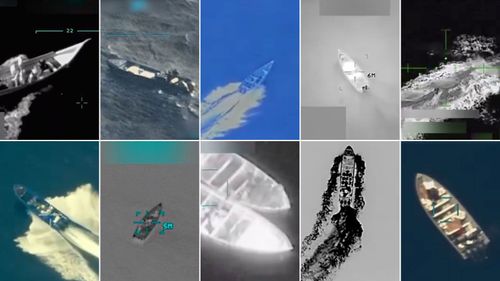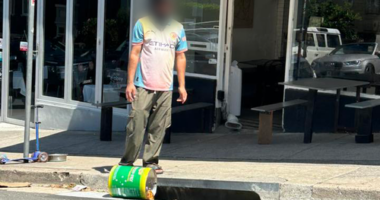Share this @internewscast.com
Recently, the Trump administration revealed to Congress that the United States is now engaged in what it describes as an “armed conflict” against drug cartels. This announcement came after the U.S. executed its first strike on September 2. The administration has termed those who were killed during these operations as “unlawful combatants,” justifying lethal strikes without judicial oversight based on a secretive Justice Department decision.
In a notable shift, the U.S. military has expanded its operations to the Pacific, following seven prior strikes that were exclusively carried out in the Caribbean Sea. This escalation aims to target vessels associated with drug trafficking, marking a significant broadening of their campaign.

Defense Secretary Pete Hegseth underscored the U.S. commitment to combating these threats, stating, “Narco-terrorists intending to bring poison to our shores will find no safe harbor anywhere in our hemisphere.” This statement reflects the administration’s resolute stance on eradicating drug smuggling operations.
One of the most recent attacks, the tenth of its kind, resulted in the deaths of all six crew members on board. This particular strike was conducted at night on a ship allegedly operated by the Tren de Aragua cartel in the Caribbean, indicating the intense and ongoing nature of these operations.
Among those impacted by these strikes, three individuals survived. Two of these survivors were temporarily detained by the U.S. Navy before being repatriated to their respective countries, highlighting the complex international implications of the U.S.’s aggressive new strategy.
The Defence secretary said the US conducted a nighttime attack on a ship allegedly operated by Tren de Aragua in the Caribbean.
October 27, multiple strikes
Hegseth reported multiple strikes in a single day for the first time, with three missiles hitting four vessels in international waters of the eastern Pacific on Monday, 27th.
He reported that 14 people were killed aboard the vessels “operated by designated terrorist organisations” and that there was one survivor who was not recovered.
“The four vessels were known by our intelligence apparatus, transiting along known narco-trafficking routes, and carrying narcotics,” the Defence Secretary stated.
Hegseth said that the US military had contacted the Mexican government to look for the survivor.
The Mexican Navy said Friday that the search is in a “suspended active” status and the person is considered missing.
The United States Armed Forces carried out an attack on a vessel in the Pacific Ocean that left four dead, Hegseth reported.
“This vessel, like all the others, was known by our intelligence to be involved in illicit narcotics smuggling, was transiting along a known narco-trafficking route, and carrying narcotics,” the Defence Secretary said in a post on X.
He added that US forces suffered no casualties.
The US military carried out a strike on another vessel in the Caribbean Sea and killed three people on board, according to Hegseth.
“Today, at the direction of President Trump, the Department of War carried out a lethal kinetic strike on another narco-trafficking vessel operated by a Designated Terrorist Organisation (DTO) in the Caribbean,” Hegseth announced on X with an unclassified video of the strike. No US forces were harmed in the strike, he noted.












